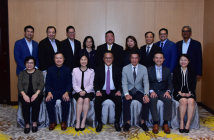
Contributed by Future Directions International (http://www.futuredirections.org.au/)
Background
Fourteen suspected militants belonging to the so-called Islamic State (IS) were arrested in raids across five states in Malaysia between 14 and 20 July. The arrests were made in Selangor, Perak, Kedah, Penang and Sabah by the Special Branch of the Royal Malaysia Police. In addition to the suspected militants, an improvised explosive device (IED) was also seized. According to the Straits Times, twelve of those arrested belonged to the same cell and were suspected of taking orders from known militant Muhammad Wanndy Mohamed Jedi to launch attacks in Malaysia. Wanndy Mohamed is a known recruiter for IS, who appeared in a beheading video filmed in Syria in 2015 and is accused of directing the attack in Jakarta earlier this year. Another of the men arrested was a senior IS member who was active in recruiting members in the northern state of Kedah.
Comment
The Malaysian authorities have been escalating their crackdown on suspected terrorists. The latest arrests follow raids in March this year in which fifteen terror suspects were arrested, all of whom had links to Wanndy Mohamed. Since 2013, Malaysian authorities have arrested over 200 people with suspected links to IS, with the most prominent areas of arrest being along the west coast of peninsular Malaysia including Kedah, Perak and Kuala Lumpur. The distribution of the arrests largely coincides with the general population distribution as well as the fact that the northern areas of peninsular Malaysia are generally more conservative than the eastern states of Sabah and Sarawak.
The growing presence of IS and its supporters in South-East Asia has been of concern for some time. In May 2015, Singaporean Prime Minister Lee Hsieng Loong highlighted these concerns in a keynote address: ‘South-East Asia is a key recruitment centre for ISIS. More than 500 Indonesians have joined this terrorist group. Dozens have gone from Malaysia’. The fears of an IS presence in Malaysia were confirmed when it was revealed that several Malaysian leaders were on an IS hit list. Also uncovered were details of a meeting between Abu Sayyaf, the Islamic State and the Moro National Liberation Front. In the meeting, which took place on 15 November 2015, attendees passed several resolutions, including mounting attacks in Kuala Lumpur and Sabah. The apparent level of public support for IS in Malaysia is also of concern. In a poll conducted by the Pew Research Centre in November 2015, 64 per cent of Malaysian respondents expressed an unfavourable view of IS, but 11 per cent expressed a favourable view of the group. Of the other eleven Muslim-majority countries surveyed, Malaysia was the most supportive of IS, with only the exceptions of Senegal and Pakistan.
Factors behind the apparent support for IS in Malaysia could be the Arabisation and politicisation of Islam within that country. The term “Arabisation” is used by moderate Muslims in Malaysia to describe the rapid spread of Islamic conservatism in the country. As sociologist Syed Farid and historian Eddin Khoo point out, there is a cultural struggle underway in which some Malaysia see the Middle East – and Saudi Arabia in particular – as more being authentically Muslim. In an attempt to be more “authentic” themselves, such individuals have aspired to stricter, more fundamentalist beliefs in the form of Saudi Wahhabism. This could explain how a select few could become sympathetic to even harsher, so-called “Islamic” ideals enshrined by groups such as the Islamic State. The politicisation of Islam is also a cause of concern as political parties try to ‘out-Islam’ each other, as Joseph Chinyong, professor of Comparative and International Politics, suggests. It thus appears that Islam in Malaysia will continue to be subject to Arabisation and politicisation.
Looking at methods to counter the Islamic State, the findings of Dr Emile Nakhleh, writing in his recent FDI Associate Paper can also be applied to Malaysia:
The religious narrative used by killers to justify their actions in the name of their religion must be delegitimised and credible moderate voices within Islam identified and empowered to speak up against those who are hijacking their faith.
It is often difficult to dissuade an extremist from his or her views but entirely possible to diminish that influence through counter-narrative. While this is important, it will probably not be enough to stem IS support in Malaysia. As noted by the United States Agency for International Development, personal contact with established IS affiliates is the most important route for potential recruits. While pro-IS websites may pique the interest of potential recruits, it is through their personal contact with IS affiliates and recruiters that recruits gain more detailed information prior to the selection and training processes. It is those affiliates and recruiters, who have direct connections with IS or IS-affiliated groups, who need to be removed from the chain of communication linking IS to potential recruits.






